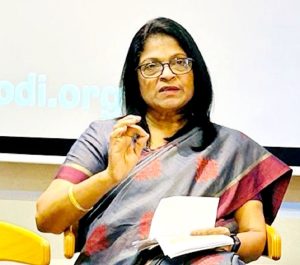 Sri Lanka says its decision to join China’s Belt and Road Initiative (BRI) stemmed from its aspirations for economic development, infrastructure enhancement, and regional connectivity.
Sri Lanka says its decision to join China’s Belt and Road Initiative (BRI) stemmed from its aspirations for economic development, infrastructure enhancement, and regional connectivity.
The Ambassador of Sri Lanka to Belgium and Luxembourg and the Head of Mission to the European Union Grace Asirwatham participated as one of the panelists in a high-level policy event in Brussels titled “Looking back, looking forward: Global South perspectives of the Belt and Road Initiative (BRI)”.
Ambassador Asirwatham emphasized Sri Lanka’s experiences with the Belt and Road Initiative (BRI), highlighting its significance as a compelling option for substantial investments in vital infrastructure projects.
She mentioned that Sri Lanka’s decision to join the BRI stemmed from its aspirations for economic development, infrastructure enhancement, and regional connectivity. Further, in her remarks about the future of the BRI, Ambassador Asirwatham expressed her belief that it should evolve into a platform that not only fosters physical connectivity but also supports global good, including environmental protection, renewable energy transition, human development, and social progress, and helps developing countries achieve Sustainable Development Goals (SDGs) as well as the Paris Agreement on Climate Change.
The event provided a platform for an open dialogue where the panelists shared valuable experiences, successes, and challenges related to BRI projects. The outcome of the meeting was a deeper understanding of how the BRI could serve as a catalyst for sustainable economic growth and infrastructure development, including the need for diligent evaluation and sustainable debt management in pursuing such initiatives.
The panel included the Ambassador of Kenya, the director of the European Institute for Asian Studies (EIAS), the director of the Overseas Development Institute (ODI) Europe, and other experts. The event was hosted by ODI Europe, a UK-based think tank with a European presence in Brussels. (Colombo Gazette)


Post a Comment